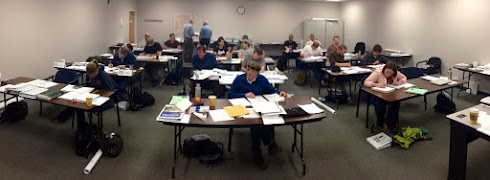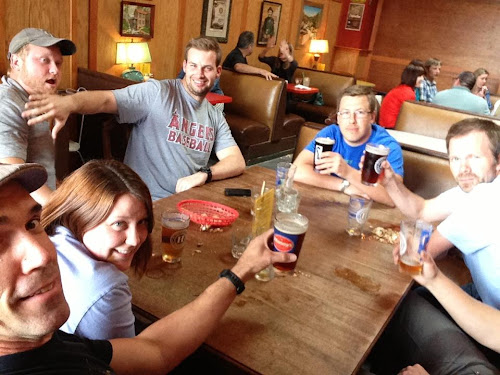I just returned home from Seattle after 3 weeks of Terrestrial Navigation at PMI. I will admit, it was one of the hardest academic sessions I've ever endured, mostly because of the time frame and complexity of the topics... new material, quick progression, and concepts that are foreign and hard to grasp at first. Most everyone hung well, but it was a great deal of studying and staring at numbers. The topics weren't that difficult, but we weren't allowed too much time to sit back and take it in. You keep up, or get behind. All said and done, we were able to understand everything needed and pass the exams and assessments, but it required some serious focus and determination, mixed with a little coffee and fire.
 |
| TCNAV Certificate |
So, I passed. There were a few days during the session that I thought that I may not do so, but with a little help and extra study time, it all came together like a complex symphony of brass, woodwind, drums, and a little didgeridoo. Celestial Nav is on deck for next summer, and I'm sure we will once again get punched in the face while drinking from the fire hose.
I'm home for a little more than a month, and then crewing up at the end of July for another 30-40 day trip to Western Alaska.
My last day in Seattle was spent with Erin. She flew up Friday night and I did my best to give her a quick tour of Seattle's best before we hopped in the car for the 12hr drive back to Sac. Saturday was our 17th wedding anniversary, and during our short stint in town, we managed to get a quick tour of the important things... Alki Beach, PMI drive-by, Pike Place, Ballard, Fremont, the Pink Door and a few other fun sites along the way.
The rest of my classmates are still hard at work, completing their Lifeboatmen course this week in Seattle and Anacortes. I did mine in April, so I was able to head home early. School starts up again in October with a few good classes: Leadership, vessel Security Officer, Radar Observer Unlimited, ARPA, Contruction and Stability, Emergency Procedures, and Search and Rescue. Many topics spread out over 5 weeks and I'm sure the pace of the program will once again be challenging. I stole this quote from one of my classmates FB page that sums up my thoughts on the difficult classroom workload... "A smooth sea never made a skillful sailor". So, we continue on and "gitter-dun".
If you are reading this in preparation for joining the program, I have two pieces of advice, maybe 3 for the TCNAV class, which probably applies to a few of the courses in the program.
1. Put your social life on hold for 3 weeks and get good rest. It's like running a marathon and you need energy to keep up with those around you.
2. Don't assume that you'll do fine. Plan for the worst, prey for the best. It'll come at you fast, so pay attention and ask questions.
3. Don't "over-study". 3 hours per night max. I pulled a few 5-6 hour sessions at home and it fried my brain to the point where I couldn't think straight the next day.
Now, where did I put my flip flops and Modelo?.....











